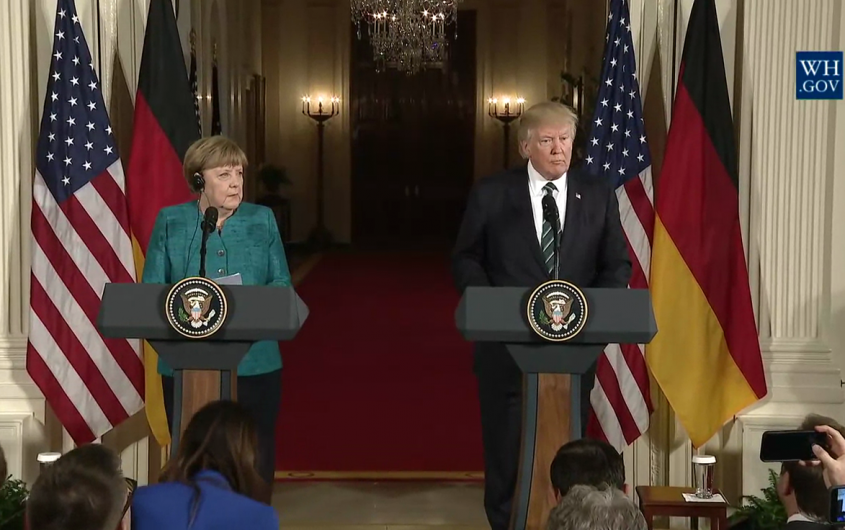
The White House
Merkel’s Return Engagement: An Ambitious Agenda, Too Little Time

Jackson Janes
President Emeritus of AGI
Jackson Janes is the President Emeritus of the American-German Institute at the Johns Hopkins University in Washington, DC, where he has been affiliated since 1989.
Dr. Janes has been engaged in German-American affairs in numerous capacities over many years. He has studied and taught in German universities in Freiburg, Giessen and Tübingen. He was the Director of the German-American Institute in Tübingen (1977-1980) and then directed the European office of The German Marshall Fund of the United States in Bonn (1980-1985). Before joining AICGS, he served as Director of Program Development at the University Center for International Studies at the University of Pittsburgh (1986-1988). He was also Chair of the German Speaking Areas in Europe Program at the Foreign Service Institute in Washington, DC, from 1999-2000 and is Honorary President of the International Association for the Study of German Politics .
Dr. Janes is a member of the Council on Foreign Relations, the International Institute for Strategic Studies, the Atlantic Council of the United States, and American Purpose. He serves on the advisory boards of the Berlin office of the American Jewish Committee, and the Beirat der Zeitschrift für Außen- und Sicherheitspolitik (ZfAS). He serves on the Selection Committee for the Bundeskanzler Fellowships for the Alexander von Humboldt Foundation.
Dr. Janes has lectured throughout Europe and the United States and has published extensively on issues dealing with Germany, German-American relations, and transatlantic affairs. In addition to regular commentary given to European and American news radio, he has appeared on CBS, CNN, C-SPAN, PBS, CBC, and is a frequent commentator on German television. Dr. Janes is listed in Who’s Who in America and Who’s Who in Education.
In 2005, Dr. Janes was awarded the Officer’s Cross of the Order of Merit of the Federal Republic of Germany, Germany’s highest civilian award.
Education:
Ph.D., International Relations, Claremont Graduate School, Claremont, California
M.A., Divinity School, University of Chicago
B.A., Sociology, Colgate University
Expertise:
Transatlantic relations, German-American relations, domestic German politics, German-EU relations, transatlantic affairs.
__
When Angela Merkel visits Donald Trump on April 27, the meeting of two vastly different personalities may again be awkward, but it may also yield some reminders of just how important the two countries remain for each other. This meeting is an opportunity to explore the importance of either country, yet whether they can do that is dependent on their ability to put substance over style.
Merkel comes as a veteran chancellor. She epitomizes stability and carefulness in both words and actions.
Trump comes as a relative novice, with a style characterized by instinct and spontaneous speech. The contrast between the two could not be greater.
The last time these two leaders met in Washington was an uncomfortable occasion with missed handshakes and a bumpy press conference. In the twelve months since, differences in style and policy were repeatedly apparent in Belgium at a NATO summit, in Italy at a G7 meeting, and in Hamburg at a G20 gathering. The tensions between Berlin and Washington have only increased with arguments over defense expenditures and trade surpluses. There is a sense that relations between Berlin and Washington have not been this bad since the days of George W. Bush and Gerhard Schröder.
Despite that, or perhaps because of it, there is plenty on the agenda. The chancellor will talk about making permanent the exemptions Trump has granted the European Union and a few other U.S. allies from steel and aluminum tariffs imposed last month but which expire next week. She can argue, also on behalf of the other 27 EU members, that deepening transatlantic commerce and combatting unfair Chinese trading practices is a shared challenge. She can recognize Trump’s increased demands for more defense spending with her new government’s commitment to an increased German defense budget and a combined European initiative. She can suggest that improvements on the Iran deal are still possible. And she can remind the president—again—of the substantial investment German industry has made in the U.S.
While Trump has perceived Merkel as a rival leader from the beginning, he sees Macron more as his soul mate after his visit in Paris.
Will that improve the atmosphere around this visit? That is not certain. Trump is clearly more drawn to the French president. Emmanuel Macron is also visiting Washington next week and—in contrast to Merkel—is being received in a festive state visit at the White House. While Trump has perceived Merkel as a rival leader from the beginning, he sees Macron more as his soul mate after his visit in Paris. And Macron has catered to that perception. Trump has also expressed preference for bilateral relations and his priority is clearly not on Berlin
Merkel’s visit may be a necessity at the beginning of her term to set Germany’s agenda with President Trump. Given the unpopularity of Trump at home, she also needs to demonstrate that she can present Germany’s interests clearly and firmly.
With all the rancor with Berlin over the past year, the response in the White House is uncertain. Yet Germany’s role in Europe remains of central importance in economic terms, as well as in forging a coherent European Union as a strategic partner for the U.S. That substantive fact has weathered the terms of previous presidents regardless of style. Over her long term in office, Chancellor Merkel has dealt with three very different presidents in the White House. She is also now presiding over her fourth (likely final) coalition government. But she has demonstrated an unusual capacity to sustain her leadership in the face of both serious challenges and changes on both sides of the Atlantic.
The Washington-Berlin relationship is still framed by cornerstones that still remain intact: economic interdependence, mutual security commitments, and shared engagement in maintaining global stability.
Trump may never warm to Merkel as his predecessor did. But the Washington-Berlin relationship is still framed by cornerstones that still remain intact: economic interdependence, mutual security commitments, and shared engagement in maintaining global stability.
There is much discussion that seventy years after the founding of the Federal Republic of Germany, the German-American partnership might be drifting apart. Change is occurring in both societies at many levels. In that process, Germans and Americans are having to redefine how, when, where, and why they need each other. That is enough of an agenda for more than one meeting.








